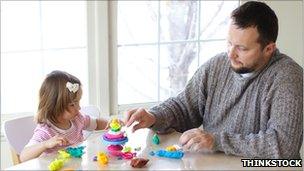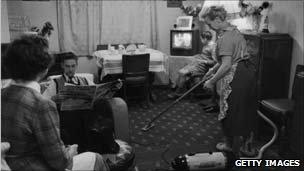Which dads help out most around the home?
- Published
- comments

Australian men spend the most time looking after children
We live, of course, in an age of gender equality - one in which men and women shoulder the burden equally. Everybody pushes the broom. Fathers wipe babies' bottoms.
There are dinosaurs out there, no doubt, but the Western world has been turned upside-down and now we are in a new age of fairness.
Except, it's not quite like that, or it's not if you read some startling new research about to be published. Cooking, caring and volunteering: unpaid work around the world, external compares who actually shoulders the burden.
The research by the Organisation for Economic Cooperation and Development (OECD) is into what it calls "the unpaid economy" in 29 countries - housework and childcare, to you and me. The findings were released just ahead of the 100th anniversary of International Women's Day on 8 March.
Unemployed fathers
The report finds that out-of-work fathers spend less time caring for their children than mothers who have a job. The two places where non-working men shoulder more of the burden (just) than working women are Hungary and the United States.
In Britain, on average, unemployed fathers spend 63 minutes a day looking after children compared with 81 minutes spent by working mums.

Fathers tend to devote most of their childcare time to teaching, reading and playing
Contrary to the image of the macho Australian, the OECD finds that men there spend the most time across the industrialised world looking after children, whether they're in work or not (69 minutes a day for a working Australian man and 105 minutes for an unemployed one).
Who does what with the children is very different right across the industrialised (and industrialising) world. Women devote most of their time with children to physical childcare (cooking and cleaning up the mess), while fathers devote most of their childcare time to teaching, reading and playing.
It may come as no surprise that women in every country spend more of their day doing housework and caring for children and others than men do in all countries.
Those who shy away from housework and childcare the most are South Korean men, who spend less than 50 minutes a day on these unpaid tasks. This rises to nearly three hours a day for men in Denmark.
Women in Norway spend just under four hours a day on unpaid childcare and housework, rising to about six hours a day in India, Turkey, Portugal and Italy.
What explains the difference?
As you would expect, in countries where more women have paid jobs, the less unpaid work they do in the home.
But the real mystery is why men invariably do less unpaid work in the home than women do.
Part of the reason for women's higher share of unpaid work is their shorter time in paid work. In Australia, Germany, Japan, the Netherlands and the UK, more than 40% of women work part time in paid jobs - and keep working hard at home, too.
Cost of unpaid caring
In countries with a relative lack of opportunity for part-time work, particularly in Southern Europe, the presence of children is an important factor associated with women's exit from the labour market.
The report's author, Veerle Miranda, says that government policy can help women who want a job. But, it can also cut both ways: "On the one hand, publicly subsidised formal childcare relieves mothers of some childcare responsibilities and encourages their labour force participation," she says.

A mother carries out the 'double shift', housework after a day's work (1957)
"On the other hand, long parental leave arrangements continue to be primarily used by women - mothers are often reluctant to give up leave to their partner's benefit - reinforcing traditional gender roles and damaging mothers' labour attachment."
What is this unpaid work at home actually worth to an economy? It all depends on how you calculate it, of course. It depends on what wage you assign to a person doing unpaid work at home for the purposes of the calculation.
But the research concludes that overall, on average across the OECD, the unpaid caring and cleaning work done at home amounts to about a third of the size of the whole economy.
This is a big slice in some countries like Britain where, if people were paid a wage for housework comparable to what they would get in a proper job, the unpaid, housework economy would be nearly as big as the paid economy.
Some conclusions do not come as a surprise: elderly and people of working age spend a similar amount of time on unpaid housework, while youth does significantly less.